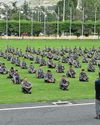
Do you dream of studying in Moldova? Er... not really.
What about Afghanistan, Mozambique or Somalia? Eh? No, not at all.
That seems about right. Except, it is not.
According to data shared by the ministry of external affairs in Parliament in August 2022, Indians who travelled abroad for education between 2019 and 2022 ended up in 228 countries/dependent islands. While a majority of students from India continue to go to the developed world, a few of them are even going to countries that are less developed than India, like Afghanistan (at least 60), Mozambique (15) and Somalia (one) in Africa, and Nauru (seven), an island country in Oceania.
Why? According to D. Dhanuraj, chairman, Centre for Public Policy Research, such choices reflect the “anxiety” of an aspirational generation. “They feel that educated Indians in less developed countries have an advantage,” he says. “There is less competition and if they stay on after their studies, they can build successful businesses and make good money. We hear many such stories, especially from African countries.”
Another reason for choosing smaller countries is the fee. Mohammed Abdul Raheem, who is studying medicine in Moldova (one of Europe’s poorest countries), says the tuition fee he has to pay over six years at the Nicolae Testemiţanu State University of Medicine and Pharmacy, the country’s only staterun medical university, is less than the fees charged by private universities in India. This is not indicative of low standards, says Joe Sharon, another student at the university.
“The government places great emphasis on developing and upgrading infrastructure and facilities,” he says. Indian students now occupy more than 40 per cent of the seats at Nicolae Testemiţanu State.
Denne historien er fra March 26, 2023-utgaven av THE WEEK India.
Start din 7-dagers gratis prøveperiode på Magzter GOLD for å få tilgang til tusenvis av utvalgte premiumhistorier og 9000+ magasiner og aviser.
Allerede abonnent ? Logg på
Denne historien er fra March 26, 2023-utgaven av THE WEEK India.
Start din 7-dagers gratis prøveperiode på Magzter GOLD for å få tilgang til tusenvis av utvalgte premiumhistorier og 9000+ magasiner og aviser.
Allerede abonnent? Logg på

POSTERS OF PROTEST
Appupen is a cartoonist who has published a few graphic novels, the latest being Dream Machine, about how AI can be a great 1 tool for an! authoritarian regime.

CLASH OF THE CIVILISATION
Even as the discovery of the Indus Valley Civilisation completes a century, some key aspects of this ancient culture remain mysterious, including its script. While the controversy over whether it was disrupted by an Aryan invasion may now be discredited, the debate over Indus ancestry and current links continues

A PROVEN PATHWAY TO PEACE
Low-cost, easy to implement, immediate results, and scientifically verified.

FOOTBALL GIVES THEM A KICK
For the children of Manipur and Mizoram, the great game is a way to a prosperous future

BATTLE FOR TOMORROW
Over the past decade, much has been said about India's potential as a leading global power.

THE TONGUE THAT TURNED
Why Greek survived while Latin and Sanskrit declined

USTAD ZAKIR HUSSAIN 1951-2024: HIS MUSIC WAS THERAPY TO THE WORLD
Flautist and Grammy co-winner Rakesh Chaurasia remembers the maestro

The magic of indigo
I really can't imagine why more of us don't throng Goa each December for the Serendipity Arts Festival alone. The festival, in its ninth year now, has the entire Panjim town celebrating.

NEW YEAR.NEW HOPE
EQUITY MARKETS HAVE TURNED VOLATILE OF LATE. WHAT TO EXPECT IN THE NEW YEAR

Seeking middle ground in Middle East
The collapse of assumptions is like the end of the world-or worldview. We assumed conwith the 20th century. But wars in Russia-Ukraine, Gaza, Yemen, Sudan, Somalia and Lebanon prove us wrong. Western defence officials now raise the nuclear threat level.